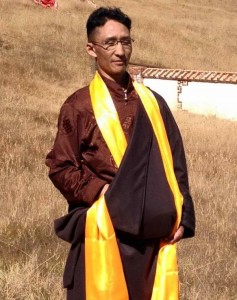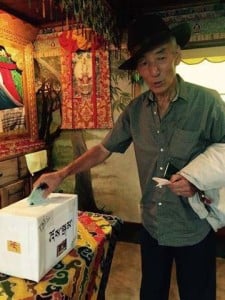Tibetan writer released from prison after ten years

Dolma Kyab, following his release from prison.
Dolma Kyab, a well-educated young Tibetan who did post-graduate study in Beijing and is highly respected among his peers, was arrested on March 9, 2005 in Lhasa, where he was teaching history at a middle school. He was tried in secret, and is believed to have been sentenced because of the ideas expressed on Tibet in his unpublished manuscript, written in Chinese and entitled ‘The Restless Himalayas’. A group of well-known Tibetan and Chinese writers wrote a letter calling for his release, but he served his full ten and a half year sentence prior to his release last week.
Amid pomp and circumstance of Xi state visit, backlash on ‘great British kowtow’
Xi Jinping received a ceremonial state welcome of the highest order in Britain earlier this week amidst a public backlash against the UK government’s compliance to the Beijing leadership, which went as far as to include the arrest of Tiananmen survivor Shao Jiang and two Tibetans for waving Tibetan flags at Xi.
As Xi travelled along the Mall in a horse-drawn carriage with the Queen, past cheering Chinese students, media attention was focused on Tibet, Uyghur, Falun Gong and dissident Chinese protesters. The arrest of Shao Jiang and the two Tibetans has been described as troubling, and they were held overnight while their homes were searched as well. “Surely the signing of billions of pounds in trade deals by the UK did not include signing away this fundamental right of all British citizens, but, in particular, silencing Tibetans,” the Tibetans told Europe Online.
Tibetan exiles participate in preliminary election for new leadership

Southern California | Photo: TA Southern California
US Government highlights lack of religious freedom for Tibetans in its annual report
On October 14, 2015, U.S. Secretary of State John Kerry released the 2014 Report on International Religious Freedom. In his remarks, Secretary Kerry stated: “The message at the heart of this report is that countries benefit when their citizens fully enjoy the rights to which they are entitled.” Kerry further urged “the release of men and women destined or imprisoned anywhere in the world for the peaceful expression and practice of their religious beliefs.”
The report’s section on Tibet states that in the TAR and other Tibetan areas, “authorities severely restricted religious freedom and engaged in widespread interference in religious practices, especially in Tibetan Buddhist monasteries and nunneries.” To read the full report, click here.

